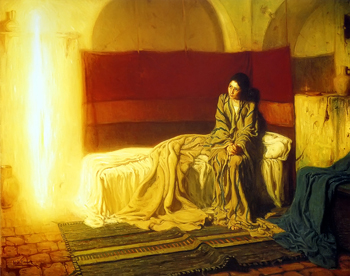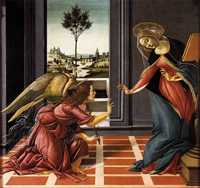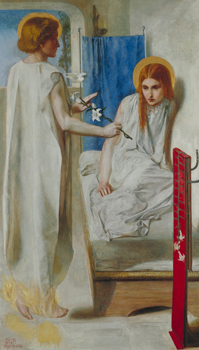The Pause Before Yes
By Debie Thomas
For Sunday December 21, 2014
Fourth Sunday in Advent
Lectionary Readings (Revised Common Lectionary, Year B)
Readings:
2 Samuel 7:1–16
Psalm 89: (1–4, 19–26) Romans 16: 25–27
Luke 1: 26–38
I was seven when I graduated from the ranks of lambs and donkeys to play Mary in my church Christmas pageant. I remember feeling quite grown‐up the first time I donned my costume — a light blue gown and white head scarf. I remember practicing my lines for days beforehand: "Behold I am the handmaiden of the Lord. Let it be with me according to your word." I remember laughing when Gabriel, finding his cardboard wings irksome, tore them clean off his shoulders during dress rehearsal.
For all the chaos of those childhood performances, there was something straightforward to me back then about Mary. Kneeling on stage with my head demurely covered and my eyes glued on Gabriel's glittery halo, I didn't think much about what the Annunciation must have cost her. Her decision to say yes to God seemed unremarkable to me, her obedience easy.
How times have changed. At this stage in my faith journey, nothing about Mary feels straightforward or easy. Despite my familiarity with her story, the mother of Jesus strikes me as a woman shrouded in mystery, a woman whose "yes" raises as many questions as it answers.
Part of the problem is that we've buried her under so many layers of theology, piety, and politics, she's nearly impossible to excavate. Some of us pray to her. Others ignore her on principle. Some call her a victim of divine coercion. Others, "Theotokos," the Mother of God. For some, she represents a troubling model of pious femininity — ever sinless, ever virgin, ever mother. For still others, she is child prophet extraordinare — a young girl who fearlessly announced the arrival of God's kingdom to earth.
 |
"The Annunciation" by Henry Ossawa Turner. |
Would the real Mary please stand up? I wish she would, because I have so many questions to ask her: When did you tell your parents you were pregnant? Did you tell Joseph yourself, or did the gossipmongers of Nazareth take care of that for you? Did anyone in the village believe your story? After Gabriel departed, did you doubt his visitation? Question your sanity? Fear for your life?
The story of the Annunciation is one of the most familiar ones in the New Testament. "In the sixth month, the angel Gabriel was sent by God to a town in Galilee called Nazareth, to a virgin engaged to a man whose name was Joseph, of the House of David. The virgin's name was Mary."
From this mind-boggling introduction, an even more mind‐boggling and rapid‐fire narrative follows. The angel greets Mary, calling her God's "favored one." He describes the divine plan for a miraculous conception. Mary expresses doubt, Gabriel explains God's plan in greater detail, Mary consents, and the angel departs.
At least half of what's maddening about this story is its brevity. We know that Mary was "much perplexed" by Gabriel's words, and that she "pondered" his greeting. We know from her question ("How can this be, since I am a virgin?") that she recognized the bizarre nature of the angel's announcement. And we know from her last words to the angel that she agreed to God's plan.
But the Gospel writer leaves a great deal out. This Advent, my attention is particularly drawn to three gaps in the Annunciation narrative.
The first is the gap between Gabriel's title for Mary ("favored one") and the task he assigns her. Tradition tells us that Mary was probably thirteen or fourteen years old when the angel appeared to her. We know that in first‐century Jewish culture, a girl who became pregnant out of wedlock faced grave danger. At the very least, she became an object of widespread scorn. At the worst — as in contemporary cultures which practice honor killings — she risked being stoned to death by the very villagers who raised her. To say "yes" in this instance was to give herself over to scandal and ostracism. It was to put everything — her reputation, her marriage, her very life — on the line.
And this is the special honor God bestowed on his "favored one"? This gap in the Annunciation story warns me that God's "favor" is not the anodyne thing I'd like to believe it is. It's not the God of the New Testament who equates divine favor with wealth, health, comfort, or ease — that's just me, getting it wrong. Mary's favored status led her straight from scandal to danger to the trauma of her son's crucifixion. God's call required her to be profoundly countercultural, to trust an inner vision that flew in the face of everything her community expected of her. As the years passed, and her son's enemies multiplied, Mary's "yes" demanded a degree of courage that makes me tremble as a mother. Let's not deceive ourselves: it is no benign thing to be favored of God.
The second gap in the story lies beween Mary's question ("How can this be?) and her consent ("Let it be with me according to your word"). In a beautiful poem inspired by Sandro Botticelli's painting, "The Cestello Annunciation," poet and memoirist Andrew Hudgins lingers in this very space, giving it a weight and richness I'd never considered before:
 |
"The Cestello Annunciation" by Sandro Botticelli. |
The angel has already said, Be not afraid.
He's said, The power of the Most High
will darken you. Her eyes are downcast and half closed.
And there's a long pause — a pause here of forever —
As the angel crowds her. She backs away,
her left side pressed against the picture frame.
He kneels. He's come in all unearthly innocence
to tell her of glory — not knowing, not remembering
how terrible it is. And Botticelli
gives her eternity to turn, look out the doorway, where
on a far hill floats a castle, and halfway across
the river toward it juts a bridge, not completed —
and neither is the touch, angel to virgin,
both her hands held up, both elegant, one raised
as if to say stop, while the other hand, the right one,
reaches toward his; and as it does, it parts her blue robe
and reveals the concealed red of her inner garment
to the red tiles of the floor and the red folds
of the angel's robe. But her whole body pulls away.
Only her head, already haloed, bows,
acquiescing. And though she will, she's not yet said,
Behold, I am the handmaiden of the Lord,
as Botticelli, in his great pity,
lets her refuse, accept, refuse, and think again.
The danger in idealizing Mary's consent is that it distorts her humanity, and keeps her story at arm's length from ours. For better or for worse, I can't relate to a person who leaps headlong into obedience. I can relate, however, to the one who struggles, to the one whose "yes" is cautious and ambivalent. I hope Hudgins' "eternity" did pass between Mary's calling and her consent. I hope the angel indeed waited compassionately for her answer, honoring all that was at stake in her freedom to accept or refuse him.
 |
"Ecce Ancilla Domini" by Dante Gabriel Rosseti. |
The third gap ends this week's reading: "Then the angel departed from her." This is a "gap" in my life with God that I both recognize and dread. It's the moment when the prayer ends, the vision recedes, the certainty wavers. It's the moment after the "yes," the moment when the mountaintop experience fades into memory, and life in the valley begins.
How different Mary's experience might have been if Gabriel had stuck around to erase her doubts and silence her critics. But no, he departed, leaving the ongoing work of discernment and discipleship to Mary alone. Her "yes" didn't signal the end of mystery. Mystery had only begun.
A popular Christmas song addressed to Mary asks what she knew when she consented to Gabriel's request: "Mary, did you know that your baby boy would one day walk on water? Mary, did you know that your baby boy would save our sons and daughters?"
We have no way of knowing what Mary knew. My guess is that like us, she knew just enough to get started. My guess is that the work of bearing God into the world involved ceaseless discovery and ongoing consent, just as it does today. My guess is that each trembling "yes" Mary whispered into God's heart, changed the world. As does ours.
Notes:
Andrew Hudgins, "The Cestello Annunciation," in American Rendering: New and
Selected Poems. Houghton Mifflin Harcourt, 2010.
Image credits: (1) Wikipedia.org; (2) Wikipedia.org; and (3) Wikipedia.org.





